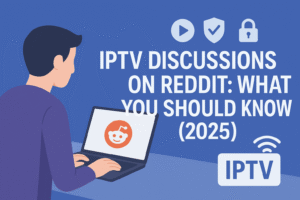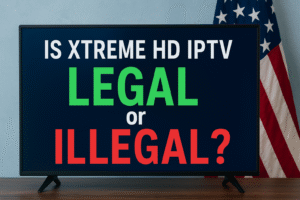Are IPTV Services Illegal? Everything You Should Know in 2025
Are IPTV services illegal? This is one of the most common questions asked by people who want to watch TV online. IPTV (Internet Protocol Television) has transformed how we consume entertainment, offering thousands of live channels, movies, and sports events over the internet instead of traditional cable or satellite. But not every IPTV service follows the same rules — and understanding the difference between legal and illegal IPTV is crucial before you subscribe.
What Is IPTV Services Illegal and How Does It Work?
IPTV stands for Internet Protocol Television — a technology that delivers TV content using internet networks rather than traditional broadcasting methods.
Services like Extremcatchon.us , Netflix, Hulu, or Disney+ technically use IPTV technology, but these platforms are licensed and regulated.
The problem arises when certain IPTV providers stream or resell copyrighted content — such as premium sports or pay-TV channels — without permission from the original broadcasters. That’s when IPTV becomes illegal.
Legal vs. Illegal IPTV
Here’s how to tell the difference:
| ✅ Legal IPTV | 🚫 Illegal IPTV |
|---|---|
| Has broadcasting rights or licenses | Streams channels without authorization |
| Offers stable, high-quality service | Often unreliable or suddenly offline |
| Uses official payment methods | May ask for crypto or gift cards |
| Provides customer support | Usually anonymous or reseller-based |
A legal IPTV provider pays for distribution rights and operates transparently. An illegal IPTV provider often uses pirated content, hosts servers in unknown countries, and advertises “10,000+ channels for $10/month.”
Are IPTV Services Illegal in the United States?
In the U.S., IPTV services are legal only if they distribute licensed content.
The Protecting Lawful Streaming Act (PLSA) allows the Department of Justice to prosecute people who run or profit from illegal streaming operations.
Operators of illegal IPTV platforms can face heavy fines, seizure of assets, or even prison time.
While everyday users are less likely to be targeted, those who knowingly subscribe to or promote unlicensed IPTV could still face consequences under copyright laws.
Are IPTV Services Illegal in USA?
In usa , the same rule applies: IPTV itself is legal — but distributing or accessing pirated content is not.
The Copyright Act and Cybercrimes Act make it a criminal offense to stream or sell copyrighted material without authorization. Authorities have already shut down illegal IPTV resellers, and users caught accessing these services risk penalties or service loss.
The Real Risks of Using Illegal IPTV
Even beyond legal trouble, using illegal IPTV can be dangerous for your privacy and finances:
-
Data Theft: Many illegal IPTV apps or websites contain malware or phishing code.
-
Payment Scams: Fake resellers can take your money and disappear.
-
No Stability: Servers go offline frequently, leaving you without access.
-
No Support: When the service fails, there’s no customer service to help.
Saving a few dollars is not worth losing your data or risking fines.
How to Choose a Legal IPTV Provider
Before subscribing to any IPTV service, ask yourself these questions:
-
Does the company list its official business name and contact details?
-
Are the payment options legitimate (PayPal, credit card, etc.)?
-
Do they clearly mention partnerships or licenses with broadcasters?
-
Are the prices realistic — or too good to be true?
If a service promises “all channels worldwide” for a small fee, that’s a red flag.
Final Thoughts: Stream Smart, Stream Legal
So, are IPTV services illegal?
Not all — but unlicensed IPTV providers are. IPTV technology itself is legal and growing rapidly, but the legality depends on whether the content is distributed with permission.
To protect yourself, always choose a verified and trusted IPTV provider that values security, reliability, and transparency.
At ExtremCatchOn.us, we help users find safe, legal, and high-quality IPTV solutions for the best streaming experience — without the risks.

















